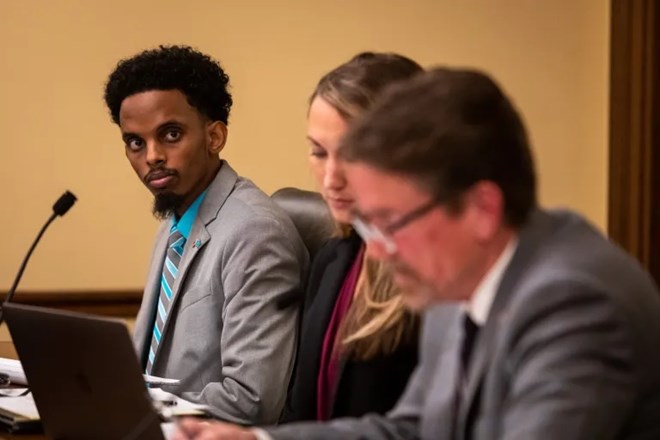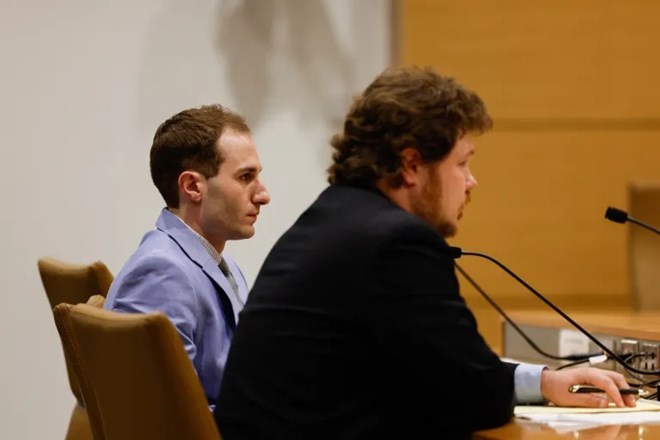
Thursday July 28, 2022
By JOEY PETERS

State Senator Omar Fateh, left, observes State Senator Mark Koran, right, read an ethics complaint against him on June 8, 2022. Credit: Ben Hovland | Sahan Journal
State Senator Omar Fateh, a DFL legislator from Minneapolis, had faced ethics complaints related to campaign finance and his campaign’s handling of absentee ballots. Later in the hearing, Omar’s former campaign manager and legislative aide, Dawson Kimyon, took the Fifth Amendment and declined to answer questions about his work on Omar’s 2020 campaign.
A state Senate ethics subcommittee dismissed most of an ethics complaint against Senator Omar Fateh Wednesday afternoon, but recommended that he undergo training from the Minnesota Campaign Finance Board. In the same hearing, Omar’s former campaign manager and legislative aide broadly declined to answer questions about his work for the first-term Democrat from south Minneapolis.
The Senate Subcommittee on Ethical Conduct, which comprises two Democrats and two Republicans, threw out the most serious allegations from the ethics complaint filed last month by seven Republican state senators.
Omar had faced two complaints accusing him of breaking three Senate rules. One complaint focused on an alleged conflict of interest involving him and Somali TV Minnesota, an online media outlet. The other complaint stemmed from his campaign’s alleged mishandling of absentee ballots in the 2020 primary election.
The senate subcommittee threw out all of the allegations specifically related to the absentee ballots.
“There was a lot of smoke, but no fire,” state Senate President David Osmek, R-Mound, who also chairs the ethics subcommittee, told Sahan Journal. “I’ve got to have fire.”
Also dismissed: an allegation that Omar allegedly sought to reward Somali TV Minnesota by authoring a bill to appropriate money to the online media outlet. The complaint said Omar’s bill came after the legislator allegedly received an endorsement and free advertising from the outlet.
“There’s no tangible evidence that you could show any level of quid pro quo or payback,” Osmek added.
But the subcommittee sustained the rest of the May 22 complaint, which faulted Omar for not disclosing payments for the Somali TV advertising in his 2020 campaign finance report. Omar admitted this mistake last month during the first ethics hearing and amended the report.
State Senator Mary Kiffmeyer, R-Big Lake, emphasized that Omar previously worked for the Federal Elections Commission, and noted that he should have “a greater degree of responsibility and culpability” than the sanction he ultimately received.
“This isn’t someone who didn’t know anything about these areas,” Kiffmeyer said.
The Senate ethics subcommittee will send the Senate Rules Committee a recommendation for Omar to receive additional campaign finance training. A final decision on that suggestion will likely come later this year.
Omar declined to take questions from news reporters following Wednesday’s meeting. He previously testified before the subcommittee that he didn’t know about and never directed any alleged absentee ballot mishandling during his 2020 run for senate. He also told the committee that he paid $1,000 for online advertising with Somali TV and was never endorsed by the media outlet. His legislation to appropriate money to the media outlet never received a hearing.
Somali TV Minnesota President Siyad Salah also testified before the committee during Wednesday’s hearing. He told the committee that Omar paid $1,000 for the advertising. Siyad also stated that Omar’s campaign provided him with the required campaign disclosure language for the ads. Siyad faulted himself for forgetting to include it before airing the ads.
At the end of the hearing, Osmek vowed to file a new complaint against Omar with the Campaign Finance Board regarding his 2020 campaign headquarters. This space belonged to an adult daycare business on Lake Street and didn’t appear on Omar’s campaign finance report. The building should have been listed as a corporate contribution, Osmek said.
Dawson Kimyon, left, testifies before the Senate ethics subcommittee with attorney William Dooling, right, on Wednesday, July 27, 2022. Credit: Jaida Grey Eagle | Sahan Journal
Omar’s former campaign manager declines to answer numerous questions
A notable moment during Wednesday’s two-and-a-half-hour hearing came during the testimony of Dawson Kimyon, Omar’s former campaign manager and legislative aide. Under questioning from senators, Kimyon invoked his Fifth Amendment rights on seven different occasions. (The Fifth Amendment of the U.S. Constitution gives people the right to not answer questions or make statements that could implicate themselves in illegal activity.)
Kimyon refused to answer questions about his work and duties for Omar’s campaign and legislative work.
This line questioning came two weeks after Dawson Kimyon refused to appear in a scheduled hearing from the same committee. Kimyon was slated to appear at the July 7 subcommittee meeting, but notified lawmakers just a few hours before the start of the meeting that they would need to subpoena him to get him to show up. On that same day, the senate committee moved to issue that subpoena.
Seated today before the committee with his attorney, Kimyon kept his comments brief.
“When you worked for the candidate, what was your role and function?” state Senator Bobby Joe Champion, DFL-Minneapolis, asked Kimyon at one point.
“I’m going to decline to answer that question on Fifth Amendment grounds,” Kimyon responded.
Kimyon also refused to answer questions about whether he communicated with Omar about absentee ballots, whether he directed or took directions from Omar’s campaign on absentee ballots, whether he helped process campaign expenses, and about the building where Omar headquartered his campaign in 2020.
Kimyon’s name first appeared during the trial of Muse Mohamed, Omar’s brother-in-law and a volunteer for Omar’s 2020 campaign. During the trial, prosecutors unsealed transcripts of testimony Muse made in the fall of 2021, speaking to a federal grand jury that was investigating possible voting fraud in the 2020 primary election.
Muse testified about delivering three absentee ballots to the Minneapolis election center during that election, and told grand jurors that he personally met with and received the ballots from the three voters. Two of those voters, however, testified at the trial that they never met Muse or authorized him to handle their ballots.
During this testimony, Muse also stated that he received contact information for the three voters from Kimyon.
Muse stuck to his story, and a state jury eventually found him guilty of lying to the federal grand jury.
Shortly after this, DFL Senate leadership placed Kimyon on leave from his position as legislative aide. Kimyon subsequently resigned from both his positions as aide and campaign manager.
During Wednesday’s hearing, Kimyon’s attorney Bill Dooling explained to a frustrated Osmek that his client was invoking the Fifth Amendment because of the continuing federal probe into possible voter fraud.
“There is an investigation that is ongoing,” Dooling said. “The Fifth Amendment allows him the right to not respond to questions if there is an ongoing investigation.”
Osmek contended that his question about the building Omar used as his campaign headquarters could not lead to a prosecution of Kimyon because Kimyon wasn’t the treasurer of the campaign and “has no culpability” in a potential campaign finance violation.
Dooling replied that Kimyon can invoke the Fifth Amendment “in relation to facts that are part of any chain of evidence leading to any prosecution.”
“If he’s got to describe the circumstances of what he fears, that defeats the purpose of the Fifth Amendment entirely,” Dooling said.
Champion, himself a lawyer, said he sometimes advises his clients to be “very thoughtful” in what they say under such circumstances.
“One of the reasons for someone invoking the Fifth Amendment right is you aren’t sure what the inquiry is about—not just from this body but what someone else is investigating. And you want to make sure that your comments aren’t misconstrued to be an admission to something that others are investigating,” he said. “It’s always better to be safe than sorry.”
Kimyon declined to talk with Sahan Journal following the hearing.